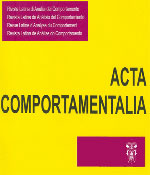Stimulus control in temporally defined schedules: the role of cancellation or maintenance of signals correlated with reinforcement and extinction
Main Article Content
Abstract
The present study evaluated the role of maintenance/cancellation of stimuli correlated with reinforcement and extinction periods on the response rate and distribution of responding in temporal defined schedules. Nine pigeons were exposed to a “T” schedule of reinforcement (60s). For three pigeons the stimulus correlated with each period Td and TA was canceled with the first response (No light Td-TA), for other three pigeons the stimulus correlated with extinction was canceled with the first response (No light TA), and for the other three pigeons the stimulus correlated with reinforcement period was canceled with the first response (No light Td ). The results showed that the control of responding is exerted by the signal, independently of its correlation with reinforcement or extinction periods. These results are discussed in terms of the presence vs. absence of the stimulus more than of the stimulus-repose-reinforcer contingency.
Article Details
Citas en Dimensions Service

<a rel="license" href="http://creativecommons.org/licenses/by-nc-sa/4.0/"><img alt="Licencia de Creative Commons" style="border-width:0" src="https://i.creativecommons.org/l/by-nc-sa/4.0/88x31.png" /></a><br />Este obra está bajo una <a rel="license" href="http://creativecommons.org/licenses/by-nc-sa/4.0/">licencia de Creative Commons Reconocimiento-NoComercial-CompartirIgual 4.0 Internacional</a>.
